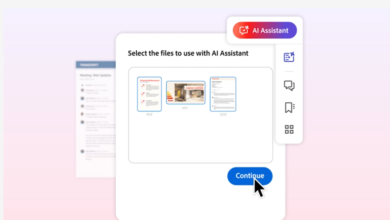Investor Relations Is the New Frontier for AI

While it may seem ubiquitous now, Generative AI technology is still relatively new. After bursting into the mainstream in the fall of 2022 following the release of ChatGPT and DALL-E, similar types of GenAI tech have been popping up in all kinds of industries. Commercial real estate has been one of the industries that has widely embraced AI-powered tech, no doubt driven in part by the potential to speed up processes and cut down on costs, especially during a challenging time for the industry. Numerous startups are targeting the sector, and a number of major brokerage firms have talked about using AI-powered software and tools in some of their processes. But the next frontier is one that most people may not think of first—-investor relations.
Put simply, investor relations, or IR, is the communication channel between a company and its investors. It’s an important and strategic function that combines several divisions of a company—finance, communication, marketing, and legal compliance—in order to achieve a few key things. First, to inform investors by delivering accurate information about the company’s financial health, performance, and future plans. For instance, updating investors on the most recent earnings report. Keeping investors up to date on the company’s financial health and moves helps investors make informed decisions about buying or selling the company’s stock. By providing transparent information, IR also helps ensure the company’s stock price reflects its true value and can help attract new investors to the company by promoting its strengths and growth potential.
The full scope of how AI can help aid investor relations professionals is still unclear, but so far, it’s already helping investor relations professionals in their day-to-day tasks. “One way I’m using generative AI is by summarizing large pieces of content, different types of reports in a much quicker timeframe,” said Gregg Lampf, vice president of IR at the telecommunications company Ciena. Some experts expect that AI could eventually become a permanent part of the toolkit that IR pros use and serve more as augmentation rather than replacement. In particular, AI could automate certain administrative tasks, and analysis could free up IR professionals to focus more on the human side of IR. GenAI could serve as a transformative tool for customer relationship management, serving to help target potential investors and maintain ongoing relationships, according to a recent EY report on the impact of GenAI on commercial real estate.
One of those tools for customer relationships is investor chatbots. Once deployed, the bots could help answer investors’ questions more efficiently. AI could be used during voting at a company’s annual general meeting as a way to gather insight into the sentiment of stakeholders and to give companies insight on how to potentially respond to questions. The tech could also be used during earnings calls or investor days to measure audience engagement and to help streamline investor presentations. Chatbots are already widely used by companies across the spectrum on their websites.
JLL unveiled its first GenAI platform last summer, JLL GPT, which it billed as the first large language model purpose-built for the commercial real estate industry. The tool was developed by JLL Technologies, the company’s tech division. It is trained on real estate-specific data from internal and external sources. The company’s initial plan for the tech was to use it in-house to simplify workflows for things like helping analyze space utilization and analyzing client feedback with AI to then extract workplace planning strategies and advice. But the company also looked ahead at future tasks that could benefit from AI, like price modeling and predictions for investors, and matchmaking for lease transactions. It’s not impossible to think that eventually, JLL may use the tool for investor relations tasks, especially since JLL GPT is being used in-house for the time being.
But do people still want to talk to a person at the end of the day? It’s a question that has been asked in numerous surveys and studies over the past several years, and the results almost always show that the majority of people do in fact, prefer to speak to a human over a bot. However, the studies tend to focus on customer service chatbots that are frequently deployed on the websites of consumer brands and numerous other industries. While the penchant for human interaction may not seem like it will change anytime soon, that may not be a problem. In the most recent version of at least one popular GenAI platform, bots are behaving more like humans, according to a study by Stanford University’s School of Humanities and Sciences.
In the study, researchers found that ChatGPT’s current versions are less agreeable and more conscientious than people, but by AI’s very nature, behaviors will evolve, meaning that future versions of the GenAI tool could reverse those tendencies or develop new ones. As humans use and interact with machines more and more, human behavior could also evolve in relation to AI, according to the study’s lead researcher, Stanford professor Matthew Jackson. “The more we understand early on—the more we can understand where to expect great things from AI and where to expect bad things—the better we can do to steer things in a better direction,” Jackson said.
AI is able to learn something about its users every time it is used. This could be important for individual communications because a chatbot can learn about each individual investor and adjust its content and even its tone accordingly. The complex tasks that AI is capable of completing in seconds could also allow chatbots to perform tasks that even a human assistant would never be able to. For example, an investor could ask a chatbot for a unique chart or dashboard, and it could generate that visual for them nearly instantly. This same process would take a highly skilled human assistant and might even require some unique code to be written to enable it. Once investors get used to the added functionality of a GenAI assistant, they might even be reluctant to go back to a human working with a call center employee.
Investor relations are a crucial component of the health of a public real estate company. Professionals in the IR space serve an important role by communicating information about the company and its financial status to existing investors, as well as attracting new investors. Not unlike many other facets of real estate, there is a lot of potential for AI in investor relations. GenAI is showing a lot of potential in helping investors interact with the company and helping companies sharpen their marketing toward potential investors. It could also be used to help gain better insight into investor sentiments and streamline the creation of investor presentations and marketing materials. Most experts believe that AI will not replace roles within IR but will instead help pros do their jobs better. And that means that with enhanced capabilities, the IR space could get more competitive, something that IR pros may want to consider when deciding whether or not to explore using the technology.



